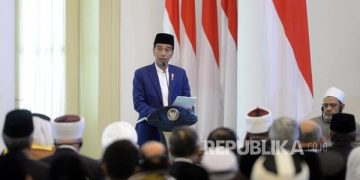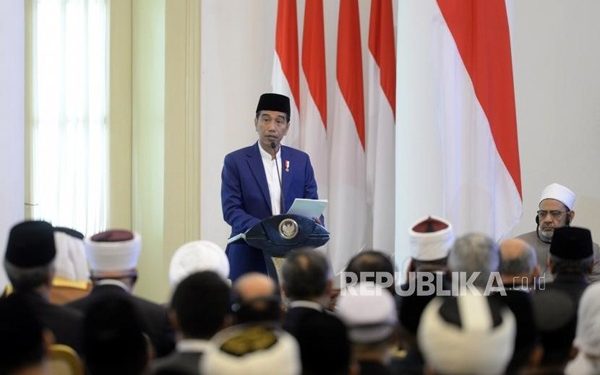
The concepts of “Rahmata Lil ‘Alamin and Washatiyah” have become hot topics in numerous schools of management in Indonesia. Both have multidimensional socio-economic, geopolitical and geostrategic dividends.
Interestingly, it has shades of even modern public administration and strategic management which stands for decency, courtesy, cooperation, compassion, sharing & caring, people centric policies, equal employers, equality and equity, fair-play and last but not least justice among organizations to maintain the real essence of competition.
Critical analysis of both reveals that both have certain aspects even in international relations, diplomacy, peace and conflict studies, multiculturalism, human psychology and sociology because all modern disciplines stand for peaceful co-existence, conflict resolution, wellbeing of common people, charity, rationality, logic, wisdom, balanced thinking & actions, middle path, shunning of extreme positions, and controlling of distorted tendencies in the modern world.
It has also certain features of the modern political Science, and diplomacy which guarantee the provision and protection of the basic human rights, civil liberties, biodiversity, rule of the law, social justice, economic freedom, rise to civility over conspiracy and thus promote holistic spirits in the society to live peacefully.
Last but not least, both may also be bases of modern structural engineering, human engineering, artificial intelligence technologies and brain sciences which all speak about holistic approach, rationality, logic, wisdom and love for humanity and nature.
The moderation tradition built by Rahmata Lil ‘Alamin and Washatiyah Islam can be the solution of the global issues. Global unrest, uncertainty, and the accumulation of global damage, worsened by poverty, illiteracy, injustice, discrimination, and many forms of violence, can be stopped with the implementation of both the holistic concepts.
Moreover, both stand for equal distribution over dogmas, sacrifice over stigmas, charity over crusades, balanced development over discrimination, widespread prosperity over persecution, mercy over fierce, modesty over modernity, and last but not least, harmony over horrendousness.
Indigenous Islam, Rational Islam, Progressive Islam, Transformative Islam, Inclusive Islam, and Tolerant Islam that appear since the 70s can be categorized as part of moderate Islam models in Indonesia which have been transformed with the help of Rahmata Lil ‘Alamin and Washatiyah Islam in Indonesia.
Rahmata Lil ‘Alamin and Washatiyah Islam always emphasize the importance of respecting and loving each other without differentiating between believes, and prohibits its believers to force their will, let alone using violence in responding to differences in belief.
Comparative study of Islam pinpoints that Rahmatan li al’Alamin. Wasathiyyah concepts first appeared in Rasulullah’s era, based on the Madinah Charter’s articles which I personally think was the start of diplomacy in Islam.
Afterward, fall of Mecca vividly reflected true spirits of Rahmatan li al’Alamin and Wasathiyyah. Rasulullah’s efforts of liberation, protection, and preservation touched the hearts of people and peers and ultimately the citizens of Mecca embraced Islam.
Now question arises why Islam in Indonesia is tolerant and moderate. One of the biggest discovery of my deep intellectual journey of knowing more about Indonesia is that Islam was actually preached through “ships not swords”, through “boats not bloodsheds” and last but not least, through puppets not persecutions. It travelled with spices and silk in which Sufis played an important role too.
Now let us talk about the various reasons of institutionalization of Rahmatan li al’Alamin and Wasathiyyah in Indonesia.
(a) Tragic incidents of Bali bombing and 9/11 were the turning points and wake-up for the political leadership and establishment of Indonesia.
(b) Furthermore enhanced existence of global franchises of terror sanctuaries (Al-Qeda and ISIS) rung bells in the power corridors.
(c) Political alienation and marginalization of common people and Muslim communities of 53 years ploughed seeds of hatred and displeasure against secular elite of the country and ultimately genie of religious violence, radicalization and extremism blasted the so-called bottle of unity in diversity in the country.
Counter Strategies
(a) Formation of two Islamic organizations, Nahdlatul Ulama (NU) and Muhammadiyah thus institutionalized the concepts of of Rahmatan li al’Alamin and Wasathiyyah in Indonesia.
(b) Madrasah reforms in Indonesia to eliminate intentions and tendencies of terrorism, radical Islam, violence, and harsh psychology. The emergence and development of madrasahs is based on Islamic principle of “keeping traditions and adopting the new when it is better.
(c) Serious legislation to discourage fatwas in Indonesia.
(d) Holistic persuasion of Islamic economy, banking, financial derivatives, Halal tourism and last but not least Islamic Fashion etc. to promote redefined and re-coined soft image of Indonesia.
(e) Streamlining and systematizing of holistic policies of pluralism and balanced prosperity.
(f) Policies of further empowerment of women etc.
Thus tragic incidents of the 9/11 in 2001 and the Bali Bombings in 2002 discourse encouraged Indonesian people to be dynamic and active in promoting rationality, developing open mindedness, and prioritizing common interests over the interest of a certain group.
Ultimately, Rahmata Lil ‘Alamin and Washatiyah concepts in Indonesia proved effective with the spirits of convergence and compromise between Islamism, nationalism, democracy and modernism.
It seems that the Indonesian state always takes the middle path and avoids formal religious expression in both domestic and foreign policies, because the state maintains the non-theocratic identity and therefore obliged to reject exclusive.
For Indonesia, Rahmata Lil ‘Alamin and Washatiyah Islam do not stand for extremism or radicalization, that always prevents violence and avoid hard line in implementing its Islam-ness.
Ironically its reversal engineering caused havocs in many regional countries i.e. Iraq, Afghanistan, Pakistan, Myanmar, Yemen and Lebanon where true spirits of Islam were intentionally misinterpreted to eliminate the other sects and tried to build various brands of Jihad.
Rahmata Lil ‘Alamin and Washatiyah Islam in Indonesia is an implementation of Islam that is not excessive, especially in religious practice, supports democracy. Therefore, both are very suitable for Indonesia because both encourage middle path and moderate way.
Rahmata Lil ‘Alamin and Washatiyah Islamic moderation in Indonesia come from the common realization among Muslims instead of enforcement from a ruler or a certain group. With these characteristics, moderate Muslims in Indonesia are those who behave in tolerant, peaceful, and cooperative manner with other religious groups. This is the merciful characteristic of moderate Islam of Indonesia, which is more theological in essence, instead of political such as those devised by the United States when interpreting moderate Islam.
It seems that Rahmatan Lil ‘Alamin and Al-Wasatiyyah have now become an extension of its well-known soft power diplomacy of organizing interfaith dialogues. Currently, Indonesia engages with no less than 31 countries in dialogues involving their religious leaders, including, among others, Russia, Finland and India.
These holy policies have attracted religious leaders in Afghanistan to adopt Islam Nusantara as part of the peace process and conflict resolution in the war-torn country.
In this regard, with the support of the NU, Afghan clerics founded the Nahdlatul Ulama Afghanistan (NUA) in June 2014. The organization had the support of some 6,000 clerics and opened branch offices in 22 out of 34 provinces across Afghanistan.
They are countering extremism and radicalism that have perpetually disrupted peace there. Other countries like Lebanon, Belgium, Russia, Sudan and Turkey have also shown interest in following the footsteps of Afghanistan, citing their impression of the NU as a role model thanks to its Islam Nusantara concept.
In this context, even Belgium is reportedly looking at the possibility of bringing the NU clerics to serve as imam in its 168 mosques for its small but growing Muslim community. There is a growing recognition that Islam Nusantara as a concept that can create an atmosphere of peaceful coexistence and tolerance in a heterogeneous society, not only in Indonesia, but also globally.
Hopefully, Rahmatan Lil ‘Alamin and Al-Wasatiyyah policies can help stem Islamophobia in many parts of the world, largely fueled by the rise of extremism often in the name of Islam. In this regard, by voicing moderation and tolerance, both challenge the rigid and strict interpretation of Islam that often leads to radicalism and extremism. Both enable befitting environment that is free from any form of sectarian conflicts is a common concern among countries across the world.
Rahmatan Lil ‘Alamin and Al-Wasatiyyah stand for true religion not mere self-defined and self-inserted rituals and regressions. Unfortunately, our world has been entangled into blind ally of prejudice, discrimination, hatred, socio-economic nationalism, political obsession of so-called democratic superiority, military compulsion of unilateralism, hunger, food & energy security, poverty, white man DNA superiority and unemployment in which unending battle between far leftists and far rightists have polluted the true essence of humanity and mutual respect. The widening gap and division between the West and the East have further damaged prospects of peaceful co-existence.
The Indonesian policies of Rahmatan Lil ‘Alamin and Al-Wasatiyyah have become beacon of hope, security, dignity, enlightenment, moderation, modesty, tolerance, cooperation, coordination and prosperity. Both are new charter of interfaith harmony and civilizational dialogue for better future because Indonesia supports the revitalization of both the holy policies in Islamic world.
Let us talk about similarities and differences of Rahmatan Lil ‘Alamin and Al-Wasatiyyah between Indonesia and Pakistan
i. Islam remained the driving force and instrumental factor in the war of liberation from the British and Dutch rulers in Indonesia.
ii. Initial political periods in both countries were dominated by secular elites. In Indonesia 2S Sukarno (1945-1965) and Suharto (1966-1998) ruled Indonesia and intentionally supported spirits of secularism. After Suharto, the democratic moment rendered an opportunity for Islamic political forces to become involved in the political process, but their capacity to govern has been quite limited. In case of Pakistan it was transformed into Islamic Republic of Islam in its first constitution 1956. However, notions of Islam has had been using for prolonging of the political survival.
iii. Secularism was intentionally used to prolong political rule and authority in Indonesia. Islam was badly misused by successive rulers in Pakistan to give strength to their own personal agendas. Thus constitutionally Indonesia is a Secular Country whereas, Pakistan is an Islamic Republic.
iv. Islamic organizations and parties played facilitating role to mobilize mobs and their supporters against the rulers (Nizam-i Mustafa Movement & Defenders of Islam).
v. Russian attack on Afghanistan and counter strategies of the USA and the West poured the money in the country to pollute the minds and souls of common people and students of Madrasahs were used/misused as scapegoat in so-called holy jihad.
vi. Unfortunately, culture and spirits of Jihad was disseminated which promoted Reverse of Rahmatan Lil ‘Alamin and Al-Wasatiyyah in the country.
vii. Birth of Taliban was the turning point in the drive of radical Islam in Pakistan. However, Gen Pervaiz Mushrraf introduced new doctrine of “Islamic Enlightenment”, by introducing Madrasah reforms, change of syllabus and banning of verses pertaining to Jihad etc. but it was partially successful.
viii. Holy alliances with Islamic organizations/parties. It has been prevalent in both countries. Jamaat-e-Islami, Jamiat Ulema-e-Islam (Fazal Rehman Group), Muhammad Tahir-ul-Qadri Minhaj-ul-Quran Tehreek-e-Labbaik Pakistan. All so-called religious parties in Pakistan extended their support to successive political governments to seek more and more power, financial bounties and castles. Thus pure spirits of Islam somehow has been eroded and polluted.
(Writes is a Director: The Center
for South Asia & International
Studies (CSAIS), Islamabad
Regional Expert: Indonesia & ASEAN)





